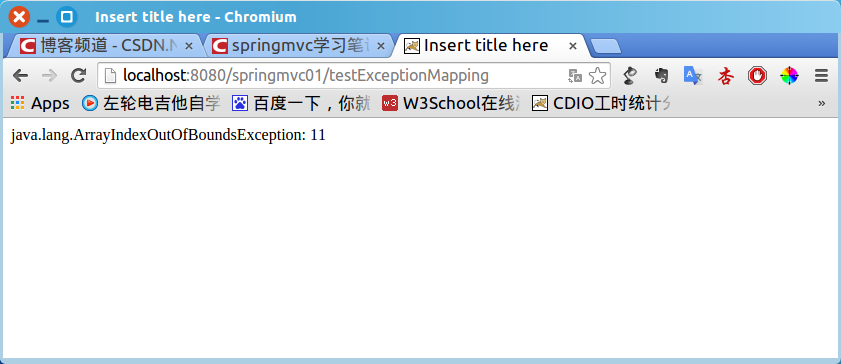如何使用HandleException
在程序中,异常是最常见的,我们需要捕捉异常并处理它,才能保证程序不被终止。
最常见的异常处理方法就是用try catch来捕捉异常。这次我们使用springmvc给我们提供的方法来处理异常
先模拟一个异常出现的场景。以下是一个简单的数学异常
package com.ibigsea.springmvc.handler; import org.springframework.stereotype.Controller; import org.springframework.web.bind.annotation.ExceptionHandler; import org.springframework.web.bind.annotation.RequestMapping; import org.springframework.web.servlet.ModelAndView; @Controller public class Exception2Handler { //注意,该注解不是加在产生异常的方法上,而是另外写一个方法 @ExceptionHandler({ArithmeticException.class}) public ModelAndView testArithmeticException(Exception e){ System.out.println("ArithmeticException:"+e); //我们要将异常在error页面中进行显示,并且将异常信息带到页面上显示出来 //这里不能采用map的方式,@ExceptionHandler和map不能配合使用 ModelAndView modelAndView = new ModelAndView("error"); modelAndView.addObject("exception", e); return modelAndView; } @RequestMapping("/testException") public String testException(){ int i = 10 /0; return "sucess"; } }
当i的值为0的时候,就会抛出数学异常。该如何捕捉呢,我们使用ExceptionHandler注解
- ExceptionHandler 的value属性是一个Class 数组,因此我们可以在该注解的属性中加入多个异常类
- 当目标方法产生异常时,将被这个方法捕捉,我们可以得到异常的实例
- 注意,捕捉异常的方法要和目标方法在同一个controller中
error.jsp
<%@ page language="java" import="java.util.*" pageEncoding="UTF-8"%> <%@taglib uri="http://www.springframework.org/tags/form" prefix="form" %> <%@taglib prefix="c" uri="http://java.sun.com/jsp/jstl/core"%> <%@taglib prefix="spring" uri="http://www.springframework.org/tags" %> <% String path = request.getContextPath(); String basePath = request.getScheme()+"://"+request.getServerName()+":"+request.getServerPort()+path+"/"; %> <!DOCTYPE HTML PUBLIC "-//W3C//DTD HTML 4.01 Transitional//EN"> <html> <head> <base href="<%=basePath%>"> <title>My JSP 'index.jsp' starting page</title> <meta http-equiv="pragma" content="no-cache"> <meta http-equiv="cache-control" content="no-cache"> <meta http-equiv="expires" content="0"> <meta http-equiv="keywords" content="keyword1,keyword2,keyword3"> <meta http-equiv="description" content="This is my page"> <!-- <link rel="stylesheet" type="text/css" href="styles.css"> --> </head> <body> 错误信息:${exception } </body> </html>
HandleException的优先级
当一个controller中有多个HandleException注解出现时,那么异常被哪个方法捕捉呢?这就存在一个优先级的问题
package com.ibigsea.springmvc.handler; import org.springframework.stereotype.Controller; import org.springframework.web.bind.annotation.ExceptionHandler; import org.springframework.web.bind.annotation.RequestMapping; import org.springframework.web.servlet.ModelAndView; @Controller public class Exception2Handler { //注意,该注解不是加在产生异常的方法上,而是另外写一个方法 @ExceptionHandler({ArithmeticException.class}) public ModelAndView testArithmeticException(Exception e){ System.out.println("ArithmeticException:"+e); //我们要将异常在error页面中进行显示,并且将异常信息带到页面上显示出来 //这里不能采用map的方式,@ExceptionHandler和map不能配合使用 ModelAndView modelAndView = new ModelAndView("error"); modelAndView.addObject("exception", e); return modelAndView; } @ExceptionHandler({RuntimeException.class}) public String testRuntimeException(Exception e){ System.out.println("RuntimeException"+e); return "error"; } @RequestMapping("/testException") public String testException(){ int i = 10 /0; return "sucess"; } }
访问目标方法,让它抛异常,看控制台打印结果,发现它抛了ArithmeticException:java.lang.ArithmeticException: / by zero这个异常
因此我们可以确定,ExceptionHandler的优先级是:在异常的体系结构中,哪个异常与目标方法抛出的异常血缘关系越紧密,就会被哪个捕捉到。
捕捉全局的异常
ExceptionHandler只能捕捉同一个controller中的异常,其实我们也有办法捕捉整个程序中所有的异常
新建一个类,加上@ControllerAdvice注解
package com.ibigsea.springmvc.handler; import org.springframework.web.bind.annotation.ControllerAdvice; import org.springframework.web.bind.annotation.ExceptionHandler; //处理异常 @ControllerAdvice public class HandleForException { @ExceptionHandler({ArithmeticException.class}) public String testArithmeticException(Exception e){ System.out.println("ArithmeticException:"+e); return "error"; } }
在这个类中使用ExceptionHandler,就能捕捉所有的controller中发生的异常
结论

52. 尚硅谷_佟刚_SpringMVC_异常处理_ResponseStatusExceptionResolver.avi
带有@ResponseStatus注解的异常类会被ResponseStatusExceptionResolver 解析。可以实现自定义的一些异常,同时在页面上进行显示。具体的使用方法如下:
1.首先定义一个异常类:
@ResponseStatus(value = HttpStatus.FORBIDDEN,reason = "用户名和密码不匹配!") public class UserNameNotMatchPasswordException extends RuntimeException{ }
- ResponseStatus注解是修饰类的
- 它有两个属性,value属性是http状态码,比如404,500等。reason是错误信息
2.人为抛出一个异常:
@RequestMapping("/testResponseStatusExceptionResolver")
public String testResponseStatusExceptionResolver(@RequestParam("i") int i){
if (i==13){
throw new UserNameNotMatchPasswordException();
}
System.out.println("testResponseStatusExceptionResolver....");
return "success";
}
3.输入如下额路径:
http://localhost:8090/testResponseStatusExceptionResolver?i=13
当然,也可以在方法上进行修饰:
@ResponseStatus(reason = "测试",value = HttpStatus.NOT_FOUND) @RequestMapping("/testResponseStatusExceptionResolver") public String testResponseStatusExceptionResolver(@RequestParam("i") int i){ if (i==13){ throw new UserNameNotMatchPasswordException(); } System.out.println("testResponseStatusExceptionResolver...."); return "success"; }
这时所有的请求都会报错。
- 仔细看这张结果图中的访问路径,我传入的参数是i=1,正常来说是不应该抛异常的,可是它抛了。。它真的抛了。。
- 结论:ResponseStatus修饰目标方法,因为你修改了响应状态码为403,并加上了错误提示(reason),所有页面回显的数据按照403错误显示页面,无论它执行方法过程中有没有异常产生,用户都会得到异常的界面。而目标方法正常执行
54. 尚硅谷_佟刚_SpringMVC_异常处理_SimpleMappingExceptionResolver.avi
SimpleMappingException异常映射
当异常发生时,我们可以将它映射到我们指定的界面
如果希望对所有异常进行统一处理,可以使用SimpleMappingExceptionResolver,它将异常类名映射为视图名,即发生异常时使用对应的视图报告异常:
在springmvc中配置
<!-- 配置使用 SimpleMappingExceptionResolver 来映射异常 --> <bean class="org.springframework.web.servlet.handler.SimpleMappingExceptionResolver"> <!-- 配置异常的属性值为ex,那么在错误页面中可以通过 ${ex} 来获取异常的信息 如果不配置这个属性,它的默认值为exception --> <property name="exceptionAttribute" value="ex"></property> <property name="exceptionMappings"> <props> <!-- 映射ArrayIndexOutOfBoundsException异常对应error.jsp这个页面 --> <prop key="java.lang.ArrayIndexOutOfBoundsException">error</prop> </props> </property> </bean>
写个目标方法测试一下
@RequestMapping("/testExceptionMapping")
public String testExceptionMapping(){
int arrays[] = new int[10];
System.out.println(arrays[11]);
return "hello";
}
这里将发生数组下标越界的异常,访问目标方法,得到如下结果
error.jsp
<%@ page language="java" contentType="text/html; charset=UTF-8" pageEncoding="UTF-8"%> <!DOCTYPE html PUBLIC "-//W3C//DTD HTML 4.01 Transitional//EN" "http://www.w3.org/TR/html4/loose.dtd"> <html> <head> <meta http-equiv="Content-Type" content="text/html; charset=UTF-8"> <title>Insert title here</title> </head> <body> ${ex } </body> </html>
这里这里的属性
${ex }必须和 <property name="exceptionAttribute" value="ex"></property>一一对应


